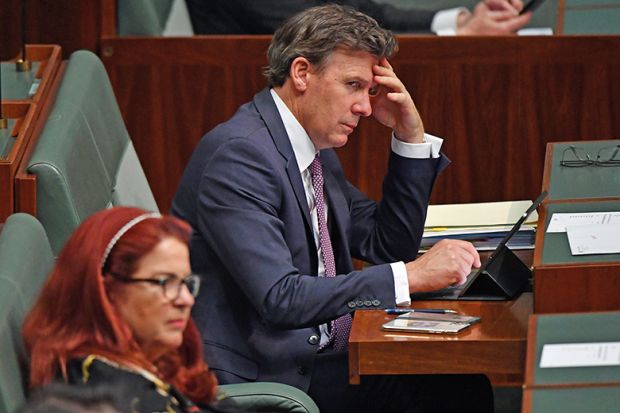Policy development work spearheaded eight years ago by Alan Tudge, Australia’s new education minister, could be dusted off to address gaps in today’s tertiary education landscape, experts said.
As a Liberal Party backbencher in opposition, Mr Tudge chaired the Coalition’s online higher education working group in 2013. It was tasked with investigating overseas trends in online learning and finding policy measures to improve campus-based delivery back home.
It was also asked to determine how institutions could best “capture” online opportunities to teach internationally, particularly in Asia.
The group’s report, “Higher education in the digital age”, was finalised in June 2013 but never released publicly. However, the government’s response to the report two years later, published as an appendix to the Draft National Strategy for International Education, outlines some of its recommendations.
They include removing “barriers to innovation” such as “volume of learning” requirements that hinder students from accelerating their courses.
Under arrangements still in force, degrees and other credentials are equated to volumes of learning expressed in full-time years. The review of the Australian Qualifications Framework (AQF) recommended a more flexible approach to these benchmarks, saying they should be expressed in hours rather than years and used for “risk management purposes” instead of regulation.
This would help to make the qualifications’ architecture “simpler and more flexible” so that students could mix and match different levels of courses more easily.
Dreams of a more integrated tertiary sector have long eluded policymakers. The AQF review was considered critical to realising this aspiration, in conjunction with several other reviews.
But while the government committed to all the AQF review’s recommendations more than a year ago, there are few signs that it has done anything to enact them.
This could change if the new minister revives his old policy deliberations. Australian Learning and Teaching Fellows president Sally Kift, who was on the AQF review panel, said the lack of action on its recommendations was a waste of money, time and “thought leadership”.
She said a more flexible approach to volumes of learning would foster an “outcomes-based approach” to education, where students obtained credit for prior learning in the workplace – an idea that has been embraced in vocational education but largely resisted in higher education.
The review also recommended a “prototype” credit point system to govern the extent to which qualifications such as vocational certificates and microcredentials could be counted towards degrees. “What everyone says we need to do is have an integrated, connected tertiary education and skills ecosystem,” Professor Kift said.
Educational design consultant Tom Worthington said Mr Tudge had been appointed just as attitudes to remote learning had been transformed by the pandemic. “It’s good timing because he will not meet so much resistance,” said Mr Worthington, an adjunct senior lecturer with the Australian National University.
Mr Tudge’s earlier work might make him supportive of innovations such as Canada’s practice of allowing online undergraduates to start their courses at any time, rather than waiting for the start of academic term. “Having months of vacation doesn’t make sense if you’re a part-time online student with a job,” Mr Worthington said.
But Professor Kift said any relaxation of rules around online education would have to be managed carefully. She said widespread fraud in Australia’s Vet Fee Help loan scheme had demonstrated how lax regulation could be exploited.




